
Some Poems by Andrew Marvell: A Personal Selection
 |
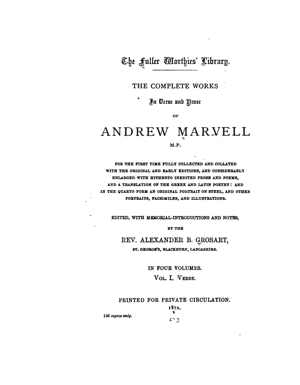 |
| Andrew Marvell (1621-1678) |
This is part of a collection of works by Andrew Marvell.
The poems here include :
- “A Dialogue between the Soul and the Body”
- “To his Coy Mistress”
- “An Horatian Ode upon Cromwell’s Return from Ireland”
A Dialogue between the Soul and the Body
Source
The Poetry Foundation <https://www.poetryfoundation.org/poems/44680/a-dialogue-between-the-soul-and-the-body>
Images and PDF: The Complete Works on Verse and Prose of Andrew Marvell M.P. , ed. Alexander B. Grosart (1875). Vol. 1 Verse, pp. 92-94. [facs. PDF].
SOUL
O who shall, from this dungeon, raise
A soul enslav’d so many ways?
With bolts of bones, that fetter’d stands
In feet, and manacled in hands;
Here blinded with an eye, and there
Deaf with the drumming of an ear;
A soul hung up, as ’twere, in chains
Of nerves, and arteries, and veins;
Tortur’d, besides each other part,
In a vain head, and double heart.
BODY
O who shall me deliver whole
From bonds of this tyrannic soul?
Which, stretch’d upright, impales me so
That mine own precipice I go;
And warms and moves this needless frame,
(A fever could but do the same)
And, wanting where its spite to try,
Has made me live to let me die.
A body that could never rest,
Since this ill spirit it possest.
SOUL
What magic could me thus confine
Within another’s grief to pine?
Where whatsoever it complain,
I feel, that cannot feel, the pain;
And all my care itself employs;
That to preserve which me destroys;
Constrain’d not only to endure
Diseases, but, what’s worse, the cure;
And ready oft the port to gain,
Am shipwreck’d into health again.
BODY
But physic yet could never reach
The maladies thou me dost teach;
Whom first the cramp of hope does tear,
And then the palsy shakes of fear;
The pestilence of love does heat,
Or hatred’s hidden ulcer eat;
Joy’s cheerful madness does perplex,
Or sorrow’s other madness vex;
Which knowledge forces me to know,
And memory will not forego.
What but a soul could have the wit
To build me up for sin so fit?
So architects do square and hew
Green trees that in the forest grew.
SOUL BODY |
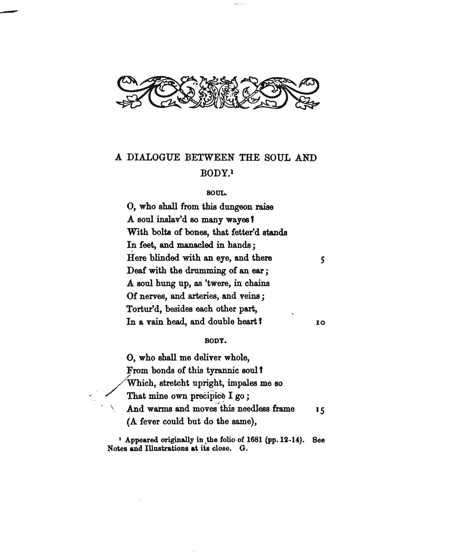 |
SOUL BODY |
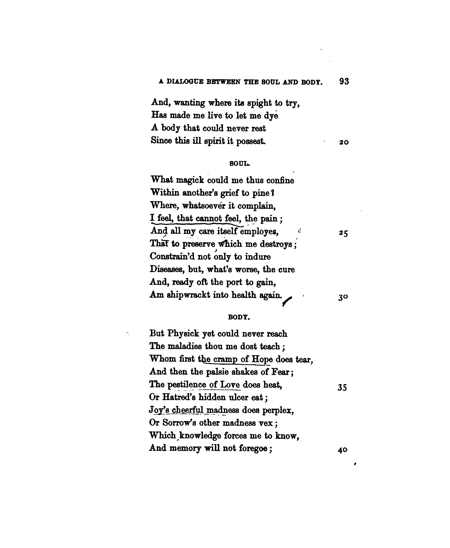 |
 |
An Horatian Ode upon Cromwell’s Return from Ireland
Source
The Poetry Foundation <https://www.poetryfoundation.org/poems/44683/an-horatian-ode-upon-cromwells-return-from-ireland>
Images and PDF: The Complete Works on Verse and Prose of Andrew Marvell M.P. , ed. Alexander B. Grosart (1875). Vol. 1 Verse, pp. 161-68. [facs. PDF].
The forward youth that would appear
Must now forsake his Muses dear,
Nor in the shadows sing
His numbers languishing.
’Tis time to leave the books in dust,
And oil th’ unused armour’s rust,
Removing from the wall
The corslet of the hall.
So restless Cromwell could not cease
In the inglorious arts of peace,
But thorough advent’rous war
Urged his active star.
And like the three-fork’d lightning, first
Breaking the clouds where it was nurst,
Did through his own side
His fiery way divide.
For ’tis all one to courage high,
The emulous or enemy;
And with such to enclose
Is more than to oppose.
Then burning through the air he went,
And palaces and temples rent;
And Cæsar’s head at last
Did through his laurels blast.
’Tis madness to resist or blame
The force of angry Heaven’s flame;
And, if we would speak true,
Much to the man is due,
Who from his private gardens where
He liv’d reserved and austere,
As if his highest plot
To plant the bergamot,
Could by industrious valour climb
To ruin the great work of time,
And cast the kingdom old
Into another mould.
Though justice against fate complain,
And plead the ancient rights in vain;
But those do hold or break
As men are strong or weak.
Nature that hateth emptiness
Allows of penetration less,
And therefore must make room
Where greater spirits come.
What field of all the civil wars
Where his were not the deepest scars?
And Hampton shows what part
He had of wiser art,
Where, twining subtle fears with hope,
He wove a net of such a scope
That Charles himself might chase
To Carisbrooke’s narrow case,
That thence the royal actor borne
The tragic scaffold might adorn,
While round the armed bands
Did clap their bloody hands.
He nothing common did or mean
Upon that memorable scene,
But with his keener eye
The axe’s edge did try;
Nor call’d the gods with vulgar spite
To vindicate his helpless right,
But bowed his comely head
Down as upon a bed.
This was that memorable hour
Which first assur’d the forced pow’r.
So when they did design
The Capitol’s first line,
A bleeding head, where they begun,
Did fright the architects to run;
And yet in that the state
Foresaw its happy fate.
And now the Irish are asham’d
To see themselves in one year tam’d;
So much one man can do
That does both act and know.
They can affirm his praises best,
And have, though overcome, confest
How good he is, how just,
And fit for highest trust;
Nor yet grown stiffer with command,
But still in the republic’s hand;
How fit he is to sway
That can so well obey.
He to the Commons’ feet presents
A kingdom for his first year’s rents;
And, what he may, forbears
His fame, to make it theirs,
And has his sword and spoils ungirt,
To lay them at the public’s skirt.
So when the falcon high
Falls heavy from the sky,
She, having kill’d, no more does search
But on the next green bough to perch,
Where, when he first does lure,
The falc’ner has her sure.
What may not then our isle presume
While victory his crest does plume!
What may not others fear
If thus he crown each year!
A Cæsar he ere long to Gaul,
To Italy an Hannibal,
And to all states not free,
Shall climacteric be.
The Pict no shelter now shall find
Within his parti-colour’d mind;
But from this valour sad
Shrink underneath the plaid,
Happy if in the tufted brake
The English hunter him mistake,
Nor lay his hounds in near
The Caledonian deer.
But thou, the war’s and fortune’s son,
March indefatigably on;
And for the last effect
Still keep thy sword erect;
Besides the force it has to fright
The spirits of the shady night,
The same arts that did gain
A pow’r, must it maintain.
The forward youth that would appear ’Tis time to leave the books in dust, So restless Cromwell could not cease And like the three-fork’d lightning, first |
 |
For ’tis all one to courage high, Then burning through the air he went, ’Tis madness to resist or blame Who from his private gardens where Could by industrious valour climb Though justice against fate complain, |
 |
Nature that hateth emptiness What field of all the civil wars Where, twining subtle fears with hope, That thence the royal actor borne He nothing common did or mean Nor call’d the gods with vulgar spite |
 |
This was that memorable hour A bleeding head, where they begun, And now the Irish are asham’d They can affirm his praises best, Nor yet grown stiffer with command, He to the Commons’ feet presents |
 |
And has his sword and spoils ungirt, She, having kill’d, no more does search What may not then our isle presume A Cæsar he ere long to Gaul, The Pict no shelter now shall find Happy if in the tufted brake |
 |
But thou, the war’s and fortune’s son, Besides the force it has to fright |
 |
 |
|
 |
To His Coy Mistress
Source
The Poetry Foundation <https://www.poetryfoundation.org/poems/44688/to-his-coy-mistress>
Images and PDF: The Complete Works on Verse and Prose of Andrew Marvell M.P. , ed. Alexander B. Grosart (1875). Vol. 1 Verse, pp. 106-8. [facs. PDF].
Had we but world enough and time,
This coyness, lady, were no crime.
We would sit down, and think which way
To walk, and pass our long love’s day.
Thou by the Indian Ganges’ side
Shouldst rubies find; I by the tide
Of Humber would complain. I would
Love you ten years before the flood,
And you should, if you please, refuse
Till the conversion of the Jews.
My vegetable love should grow
Vaster than empires and more slow;
An hundred years should go to praise
Thine eyes, and on thy forehead gaze;
Two hundred to adore each breast,
But thirty thousand to the rest;
An age at least to every part,
And the last age should show your heart.
For, lady, you deserve this state,
Nor would I love at lower rate.
But at my back I always hear
Time’s wingèd chariot hurrying near;
And yonder all before us lie
Deserts of vast eternity.
Thy beauty shall no more be found;
Nor, in thy marble vault, shall sound
My echoing song; then worms shall try
That long-preserved virginity,
And your quaint honour turn to dust,
And into ashes all my lust;
The grave’s a fine and private place,
But none, I think, do there embrace.
Now therefore, while the youthful hue
Sits on thy skin like morning dew,
And while thy willing soul transpires
At every pore with instant fires,
Now let us sport us while we may,
And now, like amorous birds of prey,
Rather at once our time devour
Than languish in his slow-chapped power.
Let us roll all our strength and all
Our sweetness up into one ball,
And tear our pleasures with rough strife
Through the iron gates of life:
Thus, though we cannot make our sun
Stand still, yet we will make him run.
Had we but world enough and time, |
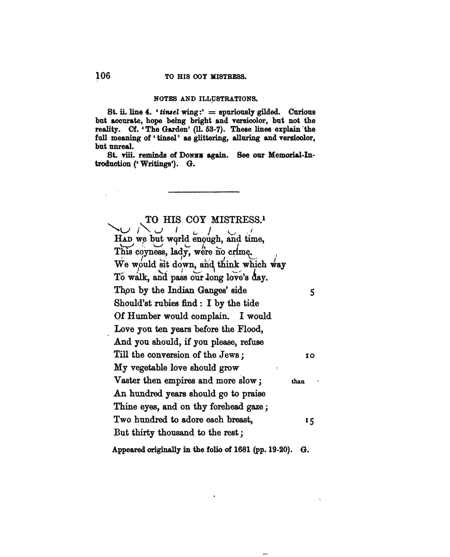 |
An age at least to every part, But at my back I always hear Now therefore, while the youthful hue |
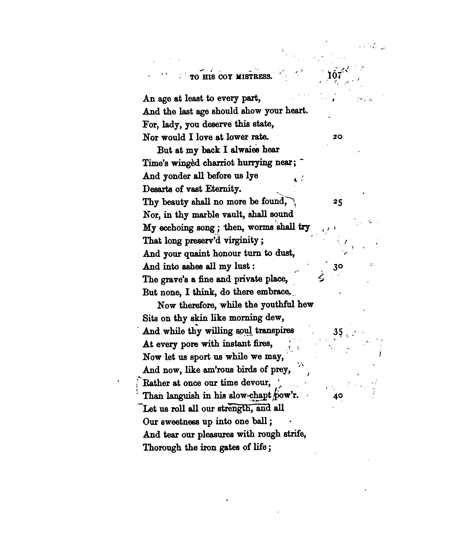 |
| Thus, though we cannot make our sun Stand still, yet we will make him run. |
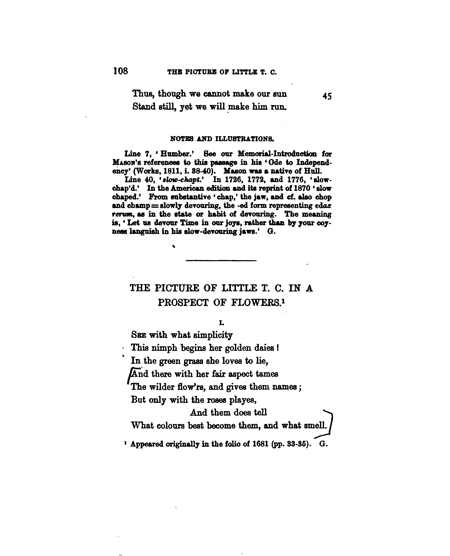 |